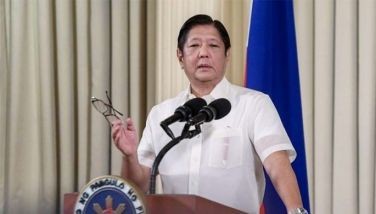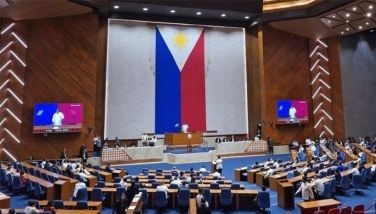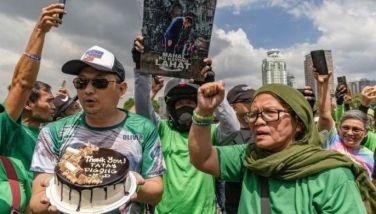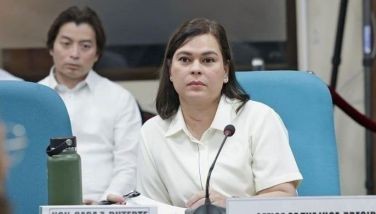Foremost a father
He was town mayor pre social media age.
It was a time when a public servant’s influence was not gleaned from what was trumpeted but on how they modeled their life and how they dealt with constituents personally. He ascended as public school teacher to information officer of a government agency. He dabbled as radio commentator until he was hand picked as running mate for vice mayor, then ran a volunteers-operated campaign to serve as mayor of our then pristine town, Sorsogon.
For three years he was addressed by his position or with his nickname appended to it: “Mayor Jun.” These days he is still addressed as such or “ex” by a handful of loyal followers. But for us, he is simply Dad or Daddy.
My siblings and I grew up in the presence and image of Dad reminiscent of what Khaled Hosseini wrote in one of my beloved novels, his first, “The Kite Runner.” Hosseini compellingly narrates how his father “saw the world in black and white. And he got to decide what was black and white. You can’t love a person who lives that way without fearing him too. Maybe even hating him a little.”
Yes, a semblance of fear would occasionally pervade our home when we were kids. Like when the boys modified a baseball game indoors using a teddy bear instead of a ball to hit. It was the bat not the toy that went flying, landing on the antique aparador, smashing its mirror into shards. The scene that followed was what children’s rights advocates would object against. The boys had a leather belt landing on their butts.
As witnesses, did my Ate and I hate Dad for that? Did our brothers? Perhaps a little, but maybe not for long because as far as I could remember, such summons were always followed by a lecture, a debriefing of sorts on why the punishment. When this happens, fear subsides and the physical pain is soothed with the concealed warmth behind Dad’s stern voice – that we are being disciplined because we are loved.
Love, for Dad, comes in many forms. Some of them we may have overlooked because oftentimes it’s his character as a disciplinarian, the strict father, that stands out.
In the movie “Freud’s Last Session,” a fictionalized encounter between Sigmund Freud and the Christian literary virtuoso C.S. Lewis, Freud tells the young Clive: “We all try so valiantly to leave our past and our childhood memories do we not? But they will never leave us will they?” I am inclined to diverge from Freud’s perspective.
These days my siblings and I, the older ones especially, try to vividly reconstruct our childhood, trials included, through the family chat. We remember a day, in the aftermath of the fire that burned our house, we must have been so cash-strapped we could not afford to take a tricycle to school. But Dad asserted we should go to school, walk if we must, he ordered. We all obeyed. Dad walked with us with our heavy bags until we reached school. For a seven-year-old, that kilometric walk to school seemed endless. Now in my midlife, a wanderer at that, I tenderly look back at the profundity of the experience: how Dad taught us valuable lessons on grit, courage, endurance – and on holding on.
On some days we girls in good humor recall Dad’s rule: be home by 6 p.m. Or how suitors were allowed to visit on weekends only at rationed time. We picture Dad sitting on a chair maybe only a foot away, as we prayed he won’t cut the conversation (muffled chats with the visitor is the better term). We chuckle at how we attended our proms chaperoned.
When Dad was mayor he once officiated an early morning wedding at our living room before traveling on an official trip. After the brief ceremony and upon Dad’s insistence, reception followed 20 steps away – at our dining room – just when we’re about to eat breakfast. Instinctively we gave up our space at the table while the newlyweds partook of sinangag, fried eggs, tinapa and pandesal. We waited while our stomach growled.
One Christmas Eve, just before Noche Buena, a distressed couple whose relative met an accident came to request for Dad’s authorization (offices were closed) to use the ambulance to transport the patient to Manila. Dad guaranteed the approval but that was before inviting them to join us in the celebration. What was supposed to be a hearty dinner warmed with pleasant conversations was flavored with mentions of blood, cuts and contusions.
Two months ago, I reconnected with a townmate who, along with her American boyfriend, we hosted for lunch at our New York home. As we talked about our hometown, my friend, out of the blue, told her boyfriend about Dad as a mayor who “doesn’t have a record of corruption.” I was floored. My eyes welled, my heart swelled with pride and wished Dad were here so I could hug him and tell him how honored I am to be his daughter.
As I write this Dad must be heading to the public market where much of his socialization takes place since he left politics. At close to 84 he remains spritely. He often sends us photos of a flower in the garden, the lovebirds (a gift on their 58th wedding anniversary), of Choco the poodle, with Mom, with friends or relatives but hardly a selfie. The photos are mostly captioned, oftentimes with reminders to take care, of assurances they are fine. They always dotingly end with “I love you” or “God bless you mga anak.”
Dad’s been out of the political limelight for over 20 years now. His light as mayor may have been dimmed by his successors. But his radiance continues to illumine our lives because for us his children, he is, foremost, a father.
- Latest
- Trending


























